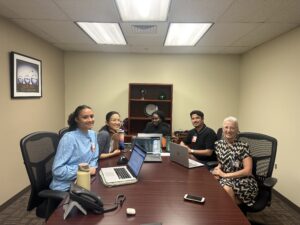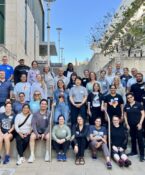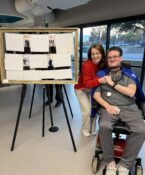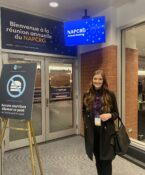THR teams up with UNT System on unique student internships to improve community health
- February 14, 2024
- By: Sally Crocker
- Community
 In a unique collaboration, Texas Health Resources has teamed up with two UNT System schools at both the undergraduate and graduate levels to work collectively on implementing community health projects. The University of North Texas Health Science Center at Fort Worth’s School of Public Health is one of those partners working with Texas Health’s Community Health Improvement Department.
In a unique collaboration, Texas Health Resources has teamed up with two UNT System schools at both the undergraduate and graduate levels to work collectively on implementing community health projects. The University of North Texas Health Science Center at Fort Worth’s School of Public Health is one of those partners working with Texas Health’s Community Health Improvement Department.
Together with community leaders, local organizations and various North Texas educational institutions, Texas Health’s Community Health Improvement works to identify and understand health disparities and the social and environmental conditions affecting health. The focus is on using data-driven initiatives to improve the health of local communities.
To facilitate a strategic approach toward advancing health equity, Texas Health met in 2021 with representatives from HSC, UNT Denton and other local universities to envision the mission and purpose, and what could be achieved together through a Texas Health University Consortium.
“We are all doing really good work. Universities are training students and providing our pipeline for public health and health professionals, and this is a great opportunity for those students to maximize their skills and learning experiences by serving the community prior to entering the workforce,” said Dr. Laurie C. Long, PhD, community site supervisor and program director of strategic initiatives for Texas Health’s Community Health Improvement.
THR’s Community Health Improvement, led by Catherine Oliveros, DrPH, views communities through a health equity lens to innovate and facilitate care for the whole person, meeting people where they live, work, play and worship across North Texas. Texas Health has been named as a U.S. Health and Human Services Healthy People 2030 Champion for the work being done to achieve the nation’s Healthy People 2030 vision.
“It takes a village to address community health issues and move beyond the traditional hospital environment,” Long said. “The top health concerns for our local communities are chronic conditions like diabetes, heart disease, stroke and respiratory conditions; health care access, literacy and navigation; and mental health.”
Developing strategic community-based student internship opportunities was one of the first projects directed by the Texas Health University Consortium. Currently, the majority of student placements are for public health students, who are given the opportunity to work with subject matter experts of diverse Texas Health programs, such as Faith Community Nursing and Community Health Ministries, Sexual Assault Nurse Examiner, Community Impact, Wellness for Life Mobile Health and other community outreach efforts. The student experience varies from semester to semester to meet the needs of the community and current initiatives. The 600-hour internship placements by HSC often allow students to move from design ideation to implementation and data analytics. Internship opportunities are offered during fall, spring and summer sessions.
“HSC’s Master of Public Health interns have been able to take on a high level of engagement,” Long said, “It’s so valuable that they are with us for a full year instead of a semester.”
“HSC has a strong process for matching students’ interests, backgrounds and goals with the needs of the partnering institution,” she added.
In the fall of 2023, Texas Health accepted seven students to work on a community readiness assessment across 12 counties. Five UNT Denton undergraduate students were paired with two graduate students, one from HSC and one from Baylor.
“Innovative problem-solving is part of our department’s guiding principles,” Long said. “Under the direction of our subject matter experts, the graduate students honed their communication and leadership skills, guiding the undergraduate students as they implemented community readiness surveys and captured data.”
HSC student Yun Tran, who graduates with the MPH Public Health Leadership online degree in fall 2024, said she has enjoyed working with both graduate and undergraduate student partners.
“Working with undergraduate students brings fresh perspectives to our planning process, and I enjoyed our time together each week as we met to reflect on our progress and discuss project updates and action plans,” Tran said. “We each brought different and complementary skills to the table and had fun planning, working and supporting each other.”
Tran and her MPH student partner helped plan, implement, analyze and report on the results of the community readiness survey, meeting with Long and other department leaders throughout the process. Marsha Ingle, senior director of Texas Health’s Community Health Improvement, and her team have also been key players in guiding and engaging the students.
The community readiness assessment is important in gaining funding for different local initiatives. Texas Health typically provides $5 million in funding to community projects each year. With matching funds, the organization was able to give back $8 million to North Texas communities in 2023.
A previous project leveraged local college and university students from UNT Dallas and Trinity Valley Community College as trusted advisors within their networks during the pandemic to provide COVID-19 education to under-vaccinated, vaccine-hesitant communities. This project surpassed its goals and HRSA objectives, demonstrating that student engagement as community health educators was beneficial.
“Partnerships like this are a big win for Texas Health, the students, participating universities and, most importantly, the community,” Long said.
“These students are providing important work,” she added, “and are involved in real-world experiences that teach them to be leaders. A strong emphasis is placed on communications skill building, collaborative decision making and recognizing their impact as part of a team effort.”
Long says Texas Health is pleased to partner with so many strong academic institutions in North Texas, where faculty, students and unique research interests can all come together for the benefit of the community.
“We will continue seeking shared grants for improving health equity,” she said. “In the meantime, we are dedicated to leveraging our resources as best we can through these very positive student engagement projects.”





Social media